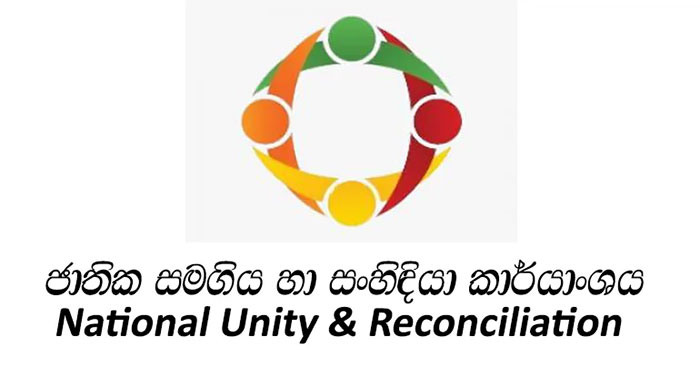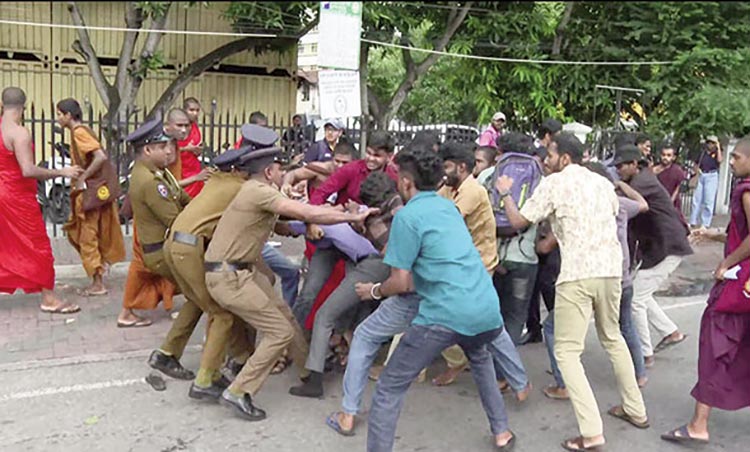News
Some civil society groups not happy with ONUR law, want further consultations

A group of civil society groups has asked the government to consult all stakeholders, both in and outside Parliament, before the enactment of the ONUR (Office for National Unity and Reconciliation) law.
The following is the text of a statement issued by the grouping: “This week the government will be taking up the ONUR (Office for National Unity and Reconciliation) Bill for debate after which it will be enacted as law. The Bill proposes to establish an Office for National Unity and Reconciliation in order to assure to every citizen equal opportunities in the economic, social, cultural and political spheres. At the same time, the new institution will have the purpose of safeguarding identity and building an inclusive society in which diversity will be respected and all communities will coexist in harmony and unity.
The commendable objectives outlined in the ONUR Bill, such as promoting national unity and peaceful coexistence, require dialogue and negotiation among representatives of diverse communities in Sri Lanka, both in civil and political societies. Unfortunately, the potential importance of this new institution appears to be under-estimated by the government, its policymakers and the law’s drafters as there has been little or no effort to engage in public discussion on it or to educate the general public about the need for it.
We, the undersigned, have three major concerns which we outline. First, we believe that the composition of the decision-making board of ONUR will be crucial to the success of the institution and its work. We note that Appointments to the ONUR Board would be appointments by the Minister under whose purview the institution comes. The Minister is empowered to recommend the appointment of 11 members who will have terms of three years, while the chairperson has no time limit, which is inadvisable. We urge a more multi-partisan method of appointments to ensure that those appointed represent the diversity of ethnic and religious groups and socio-cultural interests.
Second, as ONUR is expected to play a central role in the national reconciliation process that brings together all the independent reconciliation mechanisms we propose that appointments to the ONUR board should include ex-officio representatives from the Office of Missing Persons, Office of Reparations, NGO Secretariat and the Truth, Unity and Reconciliation Commission which is soon to be established. This will ensure that all the reconciliation institutions share a common vision and are informed of the work that is being done by each of them. There is also a need to ensure representation from civil society to ensure that the perspectives of affected communities and victims are considered and acted upon.
Third, we are concerned about the role given to ONUR to be prescriptive vis-a-vis civil society by virtue of the power “to guide and facilitate peace and reconciliation programmes conducted by local organisations including community based organisations.” This authority to monitor and review the work of civil society raises concerns about the prospect of government heavy-handedness in the context of the possible politicization for narrow and partisan purposes of national reconciliation policy and actions. The new law needs to be clear that the government will not direct civil society to follow its guidelines, but can “assist and facilitate” them to do so.
National reconciliation cannot be enforced from the top down. It needs to be a voluntary process involving all ethnic and religious communities. There is a need to draw civil society and elected political representatives into the discussion about the new institution. Prior to the passage of the new law, we urge the government to engage with opposition political parties, particularly those representing minority ethnic and religious communities, as well as civil society, to establish a multi-partisan consensus, encompassing pluralistic values on the path to make this a true reconciliation process for national unity.”
The signatories were Ihsaan A. Hameed, National President, All Ceylon YMMA Conference , D.M. Nimal Dissanayake, Coordinator, Anuradhapura District Citizens Committee, Sachitha N. Hewage, Chairman, ASIA LANKA Social Development Co-operation (ALSDC), Visaka Dharmadasa, Chairperson, Association of War Affected Women (AWAW), Dr Joe William, Director, Centre for Communication Training (CCT), Mohamed Buhary, Executive Director, Eastern Social Development Foundation (ESDF), Amar Gunatilleke, Executive Vice Chairman, Marga Institute, G.V.D. Tilakasiri, President, Free Trade Union Development Centre (FTUDC), Anthony Vinoth, Executive Director, Human Rights Hub, Fr. Nandana Manatungea, Director, Human Rights Office (HRO), Sakunthala Kadirgamar, Executive Director, Law & Society Trust (LST), B.W.Gunasekara, National Ethnic Unity Foundation (NEUF), Dr. Jehan Perera, Executive Director, National Peace Council (NPC), Michael Joachim, Executive Director, Plantation Rural Education Development Organisation (PREDO), Philip Dissanayake, Executive Director, Right to Life (R2L), Niroshan Ekanayaka, Executive Director, SAMADANA, Nawaz Mohammed, Country Director, Search for Common Ground (SFCG), Aashiq Alabdeen, Chief Executive Officer, Serving Humanity Foundation and Nadesan Suresh, Executive Director, Uva Shakthi Foundation (USF).
News
FSP asks govt. to pull out of defence deal with India

The Frontline Socialist Party (FSP) yesterday demanded an immediate termination of what it called a “secretive and dangerous” defence agreement signed between Sri Lanka and India, during Indian Prime Minister Narendra Modi’s 05 April visit.
Addressing a press conference at the party’s headquarters in Nugegoda, FSP Education Secretary Pubudu Jagoda described the agreement as a “betrayal of the nation” and a “crime against the people,” urging the government to invoke Article 12 of the deal and exit it with the required three months’ notice.
Jagoda said the document, which surfaced on social media after being published by a news portal, appears to be the actual agreement signed between the two countries. “The government has not denied its authenticity. That silence is telling,” he said.
Jagoda added that the agreement bears the signatures of Sri Lanka’s Defence Ministry Secretary Sampath Thuiyakontha and Indian High Commissioner Santosh Jha.
“What’s most troubling,” Jagoda warned, “is that both governments attempted to keep the agreement under wraps. Unlike the 1987 Indo-Lanka Accord, which was made public with all annexures, this agreement was hidden from the people, and even now, we don’t know how many other agreements exist between India and Sri Lanka.”
Jagoda said that a Right to Information request made on 04 April was met with a reply from the President’s Office stating that it had no copies of the agreement—raising serious concerns about transparency, even at the highest level. “One could question whether the President has seen it because his office does not have it,” Jagoda said.
The 12-clause of agreement reportedly covers areas such as exchange and training of military personnel, defence industry collaboration, classified information protection, and military medical services, including battlefield healthcare and telemedicine.
Jagoda said the definition of “classified information” in Clause 7 was alarmingly broad. “It allows India to label virtually anything as secret. Even weapons or military assets transferred under this agreement cannot be revealed—not even after the agreement ends,” he said, citing Clause 7.3.
Clause 10 prohibits either country from taking disputes to international courts or involving third-party mediators. “It’s like asking a rabbit to negotiate with a tiger,” Jagoda quipped, drawing parallels to the complications of the 1987 accord, which eventually saw Indian peacekeeping troops refusing to leave until a change in the Indian government.
Jagoda accused the NPP-led government of hypocrisy, pointing out that the JVP, the main component of the current regime, had vehemently opposed Indo-Lanka Accord in 1987. “Now they’ve gone and signed an even more dangerous deal,” he said.
Citing Clause 12, which allows either party to withdraw with three months’ notice, the FSP called on the government to act immediately to exit the pact. “We urge the people to unite and defeat these underhanded, sovereignty-eroding deals. The FSP stands ready to lead that fight,” Jagoda said.
News
Police crush protest, arrest student activists

The police yesterday arrested a group of students, including the Convener of the Inter-University Students’ Federation (IUSF), Madushan Chandradith, during a protest held by the Allied Health Science Graduates’ Union in front of the Health Ministry yesterday.
The police obtained an order from Maligakanda Magistrate’s Court, earlier in the day, to prevent protesters from invading the Colombo Hospital Square and the Health Ministry.
News
Deshabandu faces misconduct probe on Monday

Inspector General of Police T.M.W. Deshabandu Tennakoon is set to face formal questioning on Monday (19 May) over serious allegations of misconduct and abuse of power, parliamentary sources said yesterday.
A special Committee appointed to investigate the claims will commence formal proceedings next week, following several rounds of preliminary discussions held within the parliamentary complex in recent weeks.
The IGP has been officially notified to appear before the Committee and is expected to face the inquiry for the first time at 2:00 PM in Committee Room No. 8.
The Committee, which met again on Thursday (15) to finalise arrangements, is investigating allegations that Tennakoon misused his official powers in a manner deemed severe and improper.
-

 Features6 days ago
Features6 days agoSAITM Graduates Overcome Adversity, Excel Despite Challenges
-

 Opinion6 days ago
Opinion6 days agoDrs. Navaratnam’s consultation fee three rupees NOT Rs. 300
-

 News6 days ago
News6 days agoDestined to be pope:Brother says Leo XIV always wanted to be a priest
-

 Sports6 days ago
Sports6 days agoASBC Asian U22 and Youth Boxing Championships from Monday
-

 Features5 days ago
Features5 days agoChampioning Geckos, Conservation, and Cross-Disciplinary Research in Sri Lanka
-

 Business6 days ago
Business6 days agoDilmah – HSBC future writers festival attracts 150+ entries
-

 Midweek Review3 days ago
Midweek Review3 days agoBronze statue for P’karan, NPP defeat in the North and 16th anniversary of triumph over terrorism
-

 Business6 days ago
Business6 days agoBloom Hills Holdings wins Gold for Edexcel and Cambridge Education












